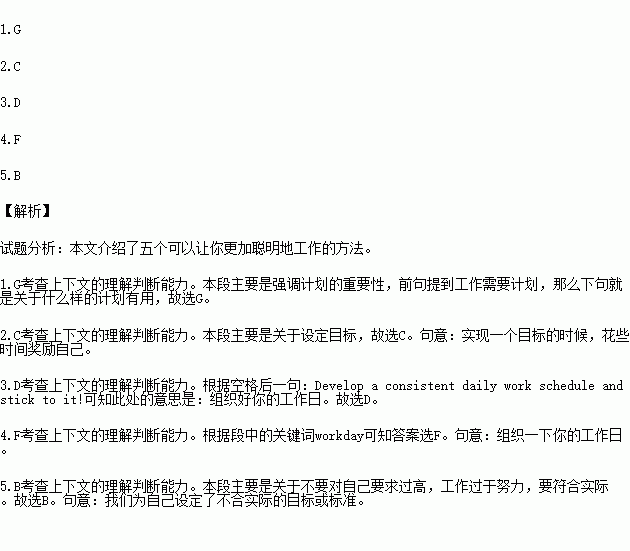题目内容
根据短文内容,从短文后的选项中选出能填入空白处的最佳选项。选项中有两项为多余选项。
Five Ways to Work Smarter, Not Harder
No matter how hard we work, it seems that there is never enough time to get all the important tasks done. Rather than working longer, consider working smarter, not harder. Here are some ways to work smarter:
Make a careful plan. Just like every organization needs a business plan, an efficient worker needs a work plan. 1. Schedule your tasks throughout the days, weeks, and months, but do it ahead of time.
Set your goals. As a part of your work plan, you should set clear and measurable goals. Goals should state which tasks are to be completed and when they get completed. Rather than setting firm deadlines, which can lead to pressure and stress, allow a period of time to reach goals. 2.
3. Develop a consistent daily work schedule and stick to it! If a typical workday consists of some writing tasks(emails, reports), one-on-one meetings, and processing data, set aside specific time each day to accomplish each kind of tasks.
Delegate(授权)effectively. 4. The person who tries to do everything himself or herself not only is overloaded and overstressed, but is bad for their colleagues, by not allowing them to be challenged and grow by taking on important duties.
Don’t make work harder than it actually is. Much of the pressure is produced by ourselves. __5. We feel like we should do more. Remember that tasks should be completed step by step. Focus on each step rather than on the entire project, which can help us cut down on feelings that we are “overwhelmed”.
A. Stick to your plan.
B. We set unrealistic goals or standards for ourselves.
C. Also, take time to reward yourself for achieving a goal.
D. Organize your workday.
E. We cannot expect to complete the tasks quickly.
F. Learn which tasks can be delegated and which need personal attention.
G. It is a well-thought-out plan to help guide and direct work activities.
 天天向上一本好卷系列答案
天天向上一本好卷系列答案 小学生10分钟应用题系列答案
小学生10分钟应用题系列答案
